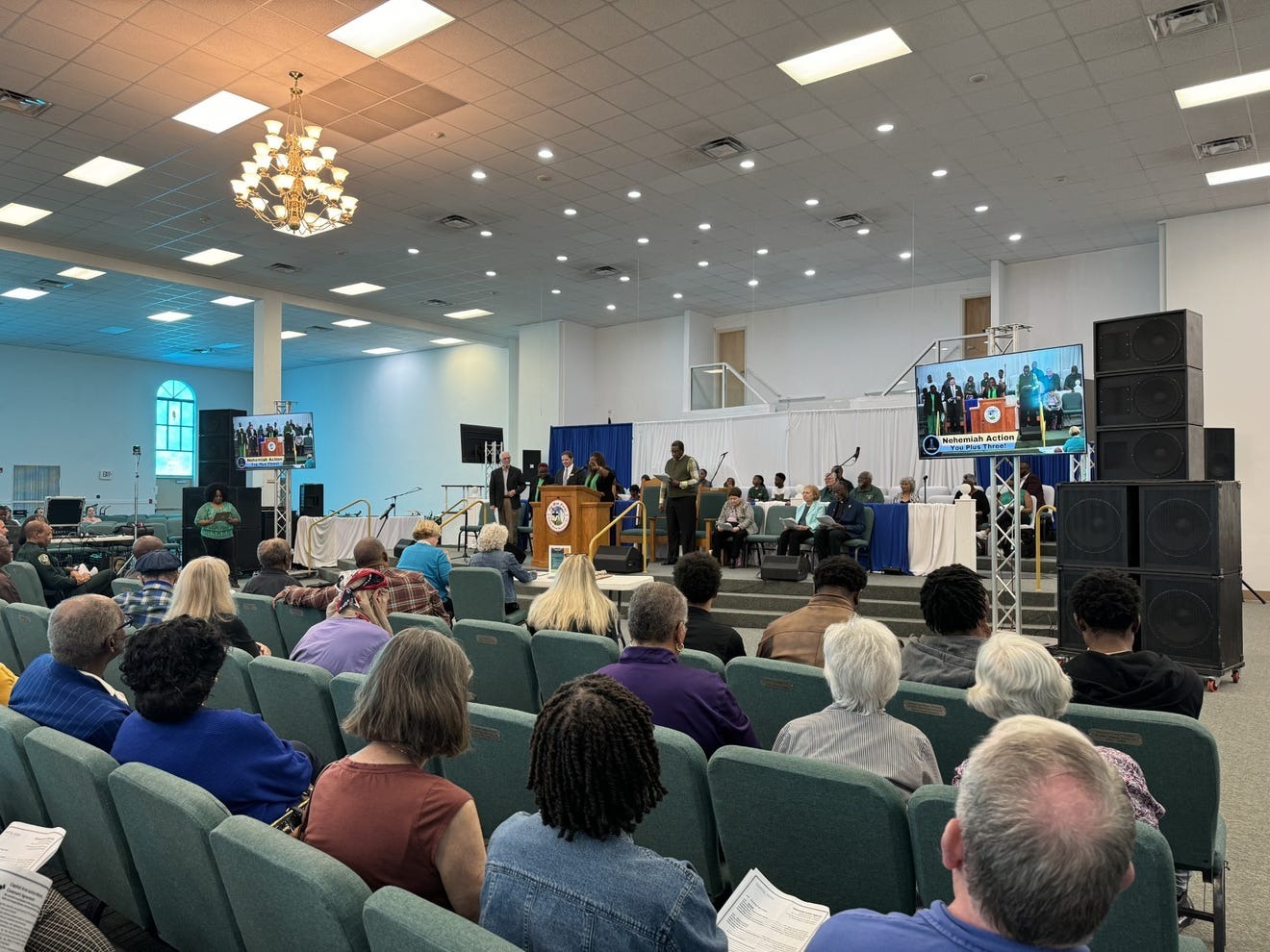By Arianna Otero, Tallahassee Democrat
In a packed room filled with 700 community members at the Old West Florida Enrichment Center, City of Tallahassee and Leon County commissioners were mostly united on questions about affordable housing – until Blueprint dollars were involved.
The seats were packed for Tuesday night’s event as attendees were reminded of the usual rules that go with the annual Nehemiah Action Meeting: If city and county leaders answered ‘no,’ they were to be met with silence, and if they answered ‘yes,’ the room would erupt in applause and cheers.
Officials had only 30 seconds to provide their reasoning ‒ a departure from the usual three minutes given to community members at commission meetings.
Officials in attendance included City Commissioners Jeremy Matlow, Jack Porter and Curtis Richardson; County Commissioners David O’Keefe, Rick Minor and Bill Proctor; Sheriff Walter McNeil and LCSO Chief of Staff Argatha Gilmore; Executive Director for the Council of the Status of Men and Boys Royle King; Tallahassee Police Chief Lawrence Revell; Leon County Schools Superintendent Rocky Hanna; and 2nd Judicial Circuit Public Defender Jessica Yeary.
The issues on the table were gun violence and affordable housing, which have been an area of concern for the many local houses of worship that comprise the Capital Area Justice Ministry, a multi-faith advocacy group.
The interest comes as new information from a survey created by the Council of the Status of Men and Boys showed the fear many have after a year of near-record violence in the capital, and a recent report by Leon County Schools showing more than 1,000 students are experiencing homelessness.
Pushing for Affordable housing is simple, but committing Blueprint sales tax dollars is complicated
The hottest topic of the night was affordable housing, which came a month after city and county Blueprint board members wrestled with and ultimately decided to initiate a substantial interlocal amendment process that could one day lead to sales tax dollars being used for land acquisition for affordable rental housing.
Richardson and Proctor were asked to speak on establishing and financing the joint city-county land acquisition through Blueprint tax surcharges and a leaseback program modeled off of one in Pinellas County that incentivizes affordable rental housing developers to set aside more units for low-income families.
Richardson spoke on how affordable housing has been a top priority for him as a resident of the city’s south side, but his speech earned him a few groans from the audience who were looking for either a quick “yes” or “no.”
Though he said he didn’t know much about the Pinellas program, he wanted to learn more about it before voting, which the justice ministry took as a “no.”
Proctor went a different route from Richardson, saying the city is already taking steps toward a leaseback program. He also defended Richardson’s position, “My friend Curtis here, I don’t know what he’s talking about, but he’s already taken steps positive in this direction.”
Local leadership then asked the remaining commissioners to stand if they supported a lease buyback program, garnering five ‘yes’es and a ‘no’ from Richardson.
Commissioners agreed in unison that they would support an amended interlocal agreement to add a project to purchase land for affordable housing. Though commissioners would disagree on whether to use annual Blueprint funds.
Minor reminded the audience he voted ‘yes’ on the previous two issues, the leaseback program and the amended interlocal agreement, but was noncommittal when it came to using Blueprint funds that may divert money from other projects already in the pipeline.
“The county gets 10% of Blueprint every year, from sales tax revenue, that’s about $6.1 million over a year,” said Minor, who has been advocating for road improvements along North Monroe. “We use that money for our road preventative maintenance program.”
Richardson provided a rapid ‘no’ in response to the use of the sales tax funds, citing priority projects like a new senior center and improvements to the C.K. Steele bus plaza.
The item on committing Blueprint sales tax surcharges to the fund would receive four ‘yes’es, a ‘no’ from Richardson, and an ‘it depends’ from Minor.
A surge in shootings and the commitment to reducing gun violence
Following a year of violence, CAJM leadership also looked to see how the Council of the Status of Men and Boys were looking to tamp down gun violence in the community. They asked King if he would commit to achieving a 10% reduction in shooting deaths in 2024, which earned a strong ‘yes’ from him.
“So a part of our focused attention strategy is not only community engagement, but building up some of the capacity of what we need to see in our community, through credible messaging and training opportunities for citizens who want to be involved in this space and in those neighborhoods,” King said.
King has recently been presenting in front of the city commission, both at their meetings and their recent budget workshop, to discuss the ongoing work.
In his presentations, he has identified hotspot policing and building strong connections between police officers and the communities they serve as potential solutions.
CAJM leaders would turn their attention from King to Richardson to see if he would agree to an increase in funding to $5 million for the council’s efforts.
Richardson said he would support the funding plan, but said King would need to request the funds at a future commission meeting where it could possibly be added to the 2025 budget.
View the original story here.






